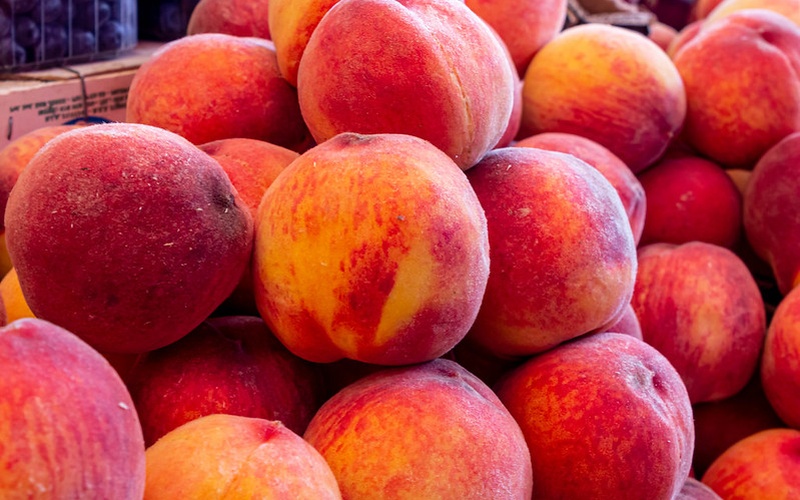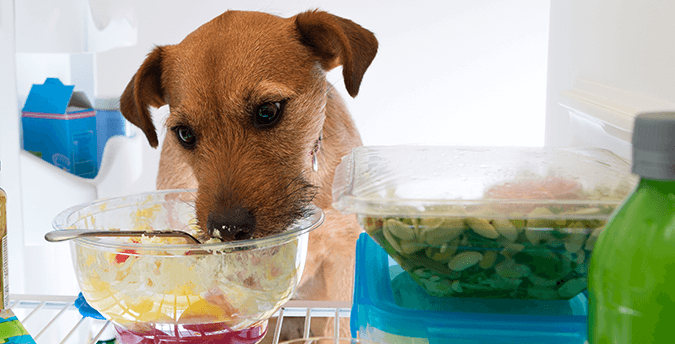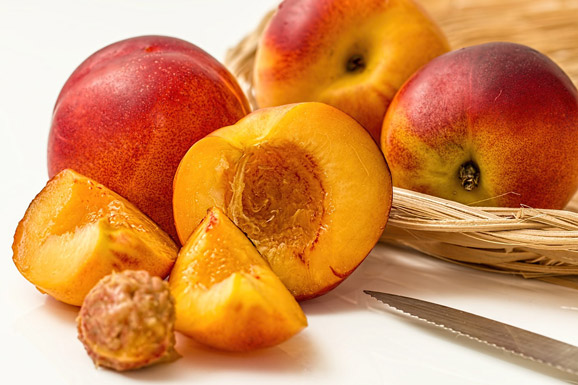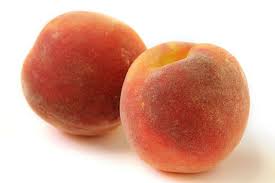For centuries and millennium’s dog is man’s best friend and a devoted companion that performs different useful tasks for humans. When you decide to bring a pet dog to your home, it is your responsibility to raise him well in a healthy environment with the best living conditions. This includes all sorts of healthy activities, accommodation, healthcare, and diet.
Most of the dogs usually try everything they come across with! That is why it takes a little bit of attention from the human side to be wary of what they are swallowing and what feed they are getting from us. Nectarines are delicious summer fruits that are juicy, enjoyable, and luscious. These are peach-like fruits with smooth skin. Many pet parents are interested in a particular topic about nectarines and dogs.
Are nectarines good for your dog?

Nectarines and their fellow peaches are safe for your pet dogs as a healthy and hydrating snack. Your pooch can eat most of this fruit and enjoy all the fruit benefits, without any health problems when given free of pit.
Dogs very much like to eat a lot of these nectarines. Its juicy sweet part is fantastic, but the only problem is its pit. The pits of many fruits have the potential choking hazard, so it is advised to keep your pooch friend away from nectarine or peach trees. The poisonous cyanide present in their pits is terrible both for dogs and humans. Too many nectarine pits could cause stomach discomfort and some other serious problems when they are crushed and taken in a large amount.
Nectarines are suitable for dogs!
Nectarines have several nutritional benefits for dogs as one of the juiciest and refreshing summer fruits. In almost every way, both peaches and nectarines are the same, but the only difference is the skin. The nectarines have smooth skin while the peaches come with fuzz on their skin. This stone fruit contains lots of healthy and beneficial vitamins and minerals like Vitamin A, Vitamin C, Potassium, and Magnesium. Nectarines also have a generous amount of dietary fiber in them.
Nutritional value of nectarines for dogs:

From Vitamin A, C, E, and K, a huge amount of vitamins are present in nectarines. Key electrolytes are also essential components of nectarines that play an essential role in the transmission of brain signals and cell signaling. From calcium to zinc, there are many kinds of phytonutrients present in nectarines.
Health benefits of nectarines for dogs:
There are many health benefits of nectarines for your four-legged furry friend:
Vitamin A present in nectarines is good for the eyes. It also makes the skin of your dog healthy and less prone to various kinds of allergies.
Nectarines contain beta carotene that is beneficial for healthy skin membranes and the eyesight of your dog.
Vitamin C is an oxidizing agent in your dog’s body that is used to make your dog able to resist infections.
Nectarines are also helpful for your dog’s fantastic heart health. The use of nectarines helps to alleviate heart problems in dogs.
Niacin is also present in nectarines that are crucial for the overall gastrointestinal health of your pup.
Potassium present in nectarines is best for the proper functioning of muscles, enzymes, and nerves.
A good amount of dietary fiber present in nectarines improves and speeds up digestion in dogs. It improves the digestive health of your dog if your dog suffers from constipation.
Nectarines are also a safe and healthy treat for pregnant dogs.
With low caloric content, nectarines are a healthy treat for chubby and fat dogs.
Health risks of nectarines for dogs:

Discussing nectarines doesn’t mean all about sunshine and rainbows. It sounds great to know the health benefits of nectarines, but there are few risks also associated with nectarines. All remains good if you introduce nectarines in your pet’s diet slowly and without pits.
The following are the risks of nectarines for your dog:
Sugar content:
The glycemic index of nectarines for dogs is not very high, which means they don’t contain too much sugar. Still, the sugar content is enough in this fruit, and you should keep an eye on your dog’s nectarine intake. Never give your dogs canned nectarines because of their added sugar and preservatives they are dangerous for dogs’ health and well-being.
NOTE: Sugar is never good for dogs and overfeeding your pooch with sugary foods can create several health issues.
Diarrhea:
The fiber in nectarines is beneficial for canines as it speeds up the digestion, but sometimes it over-speeds the process. Too much dietary fiber can also become the cause of diarrhea in your dogs. Diarrhea may lead to dehydration for your dogs. Only a few pieces of nectarines are enough for your dog in a day.
Cyanide Poisoning:
These stone fruits have a pit in the center which contains nectarine seed. This pit and seed have cyanide that is an extremely toxic chemical for dogs. Even a single pit is enough for acute poisoning in dogs. Cyanide poisoning shows the following symptoms in dogs:
- Panting
- Vomiting
- Stomach pain
- Decrease in appetite
In case of observing any of the following conditions, rush your dog to the vet for treatment.
Nectarine allergy in dogs:

Your dog may suffer from different kinds of allergies. Nectarine allergy is also common in dogs. You have to observe the nectarine allergy symptoms in your dog keenly. It is good to consult your vet if you see something wrong.
Rotten nectarines for dogs:
Rotten nectarines can be dangerous for your dog. Rotten fruits usually produce ethanol when reaching into your dog’s stomach. This ethanol is a toxic compound that is very harmful to your dog. It is always good to serve your pet fresh fruits and vegetables.
What types of nectarines are best for dogs?
Never feed the whole nectarine to your dog. Let your pooch have the fruit after taking out the pit. There are two types of nectarines:
- Clingstone variety
- Freestone variety
The Clingstone variety of nectarine has the pit joined with the flesh of the fruit. In contrast, the freestone variety has a freestone that gets easily removed from it. A freestone variety of nectarines is best for dogs as it is easy to remove the pit before feeding.
How many nectarines are enough for your dog?

However, the fruits are healthy options for human health, and these are also beneficial for your pet dogs. Keep in mind that fruits are just healthy treats for your dog, and moderation is the only secret for all kinds of foods.
When it comes to nectarines only give one to two pieces of fruit to the small dogs. Four to five pieces of nectarines are enough for the large breeds. You can serve your pet with nectarines once or twice a week and keep it just an occasional treat for your pet dog.
NOTE: Removing the skin of nectarines is also a good way to feed your dog nectarines to avoid too much fiber. Too much fiber can cause digestion and bowel issues.
Ways to add nectarines to your dog’s diet:
When you give nectarines to your dog, all you need is to wash the nectarine skin very well and then cut it in pieces before serving it to your dog after removing the pit. Slicing the nectarines into small pieces is also good to avoid choking your dog.
Pit intoxication in dogs:
Always start to give in a small amount and give only a few pieces to your dog. I find no signs of itchiness or swallow skin then you can increase its intake. Frozen nectarines can also be an ideal treat for your pooch. Puree the nectarines and mix them with some goat’s milk or yogurt. Pour the mixture into ice cube trays and freeze. This tangy, cold, and sweet treat is simply delicious for your pup.
If your dog eats a nectarine pit by chance, observe the signs of intoxication and choking there. The symptoms will be:
- Shock
- Excessive drooling
- Dizziness
- Dilated pupils
- Heavy breathing
Conclusion:
Both peaches and nectarines are safe for your dog when given in moderation. This summer fruit is low in calories with a high range of vitamins and minerals. This is the reason you can provide nectarines with your dog as a healthy and tasty treat.
Only the pit of nectarines and peaches is not safe for dogs due to the cyanide content present in seeds. Pit of nectarine and other fruits is extremely toxic for your pup and causes cyanide poisoning.
Now it is clear that:
Dogs can eat nectarines safely!
But always serve every kind of fruit to your devoted friend in a moderate amount only. Avoid canned nectarines and only prefer fresh nectarines and peaches for your pooch. These are healthy treats for your dog that never make these fruits the main source of food for your dog.
Keep the portion size small and feed your dog only a few fresh slices of nectarine from time to time. Never make nectarines a regular part of your pet’s diet.
